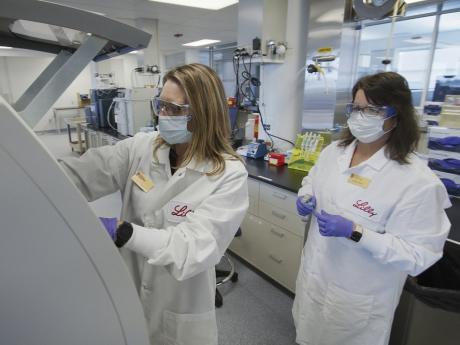Companies test antibody drugs to treat, prevent COVID-19
With a coronavirus vaccine still months off, companies are rushing to test what may be the next best thing: drugs that deliver antibodies to fight the virus right away, without having to train the immune system to make them.
Antibodies are proteins the body makes when an infection occurs; they attach to a virus and help it be eliminated. Vaccines work by tricking the body into thinking there’s an infection so it makes antibodies and remembers how to do that if the real bug turns up.
But it can take a month or two after vaccination or infection for the most effective antibodies to form.
The experimental drugs shortcut that process by giving concentrated versions of specific ones that worked best against the coronavirus in lab and animal tests.
“A vaccine takes time to work, to force the development of antibodies. But when you give an antibody, you get immediate protection,” said University of North Carolina virologist Dr. Myron Cohen.
“If we can generate them in large concentrations, in big vats in an antibody factory ... we can kind of bypass the immune system.”
These drugs are believed to last for a month or more and could give quick, temporary immunity to people at high risk of infection, such as health workers and housemates of someone with COVID-19.
If they proved effective and if a vaccine doesn’t materialise or protect as hoped, the drugs might eventually be considered for wider use, perhaps for teachers or other groups.
They’re also being tested as treatments, to help the immune system and prevent severe symptoms or death.
“The hope there is to target people who are in the first week of their illness and that we can treat them with the antibody and prevent them from getting sick,” said Dr. Marshall Lyon, an infectious disease specialist helping to test one such drug at Emory University in Atlanta.
Vaccines are seen as a key to controlling the virus, which has been confirmed to have infected more than 20 million people worldwide and killed more than 738,000.
Several companies are racing to develop vaccines, but the results of the large final tests needed to evaluate them are months away.
Russia on Tuesday approved a vaccine that hasn’t undergone such a test, sparking international concern that it was cutting corners.
Follow The Gleaner on Twitter and Instagram @JamaicaGleaner and on Facebook @GleanerJamaica. Send us a message on WhatsApp at 1-876-499-0169 or email us @onlinefeedback@gleanerjm.com or editors@gleanerjm.com.

